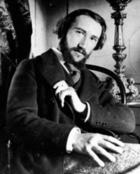
The effects of a rigid and puritan education conditioned the beginning of his literary career, which began with André Walter's Notebooks (1891), poetic prose with a symbolist orientation and a certain decadent tone. He won the favor of criticism with The Earthly Food (1897), which was an indirect criticism of all moral discipline, in which he affirmed the triumph of instincts and the overcoming of old prejudices and fears. This demand for freedom later acquired narrative expression in L'immoraliste (1902), La porte étroite (1909), Isabelle (1912) and the Symphonie pastorale (1919). After the success of Terrestrial Foods, he published Prometheus Badly Chained (1899), a reflection on individual freedom, hampered by remorse of conscience. The same concern for morality and gratuitousness are reflected in The Vatican Cellars (1914) and Corydon (1924), the latter a dialogue in defense of homosexuality, which was a real scandal. He participated in the founding of La Nouvelle Révue Française (1908) and published essays on travel, literature and politics. The false purses (1925) is one of the most revealing novels of the interwar period and revolves around his own construction and the status of a writer, although his most representative work is perhaps his Journal (1889-1942), which constitutes a sort of Bildungsroman (learning novelist). In 1947 he was awarded the Nobel Prize for Literature.




